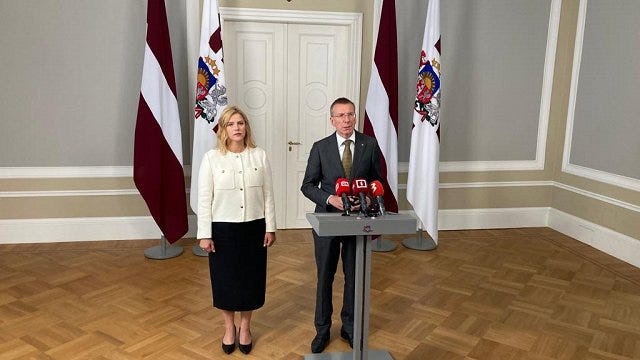Latvia’s Welfare Minister designated to be second female Prime Minister
Talks to determine five, four or three party coalition
Latvian President Edgars Rinkēvičs on August 24 nominated the current Minister of Welfare Evika Siliņa to form a new government as Prime Minister.
Siliņa from the governing centrist-liberal New Unity party (JV) was the only candidate proposed by any of the seven Latvian political parties that Rinkēvičs consulted after the current coalition under Prime Minister Krišjānis Kariņš resigned on August 17.
If she forms a coalition and is confirmed by Latvia’s 100-member parliament or Saeima, the 48-year old lawyer will become the second female head of government in the NATO and European Union (EU) member Baltic country.
Local media quoted Rinkēvičs as saying that "Siliņa's experience and knowledge are a good start to create a functioning Cabinet of Ministers.” The President, a former Foreign Minister elected by the Saeima on May 31, said he hopes a new government can be formed and confirmed by lawmakers by the middle of September.
Siliņa’s nomination by her party has already drawn social media attacks on her style of dressing and rumors about her past that some political commentators have called offensive and sexist. There has also been discussion of her friendship with the wife of a conservative-populist politician
Latvian president Edgars Rinkēvičs presented Evika Siliņa as Latvia’s Prime Minister-designate. Photo: LSM.lv
Speaking in an interview with the online Delfi TV, Siliņa admitted that she was a close friend of Inese Šlesere, the wife of Ainārs Šlesers, the leader of the populist-conservative Latvia First party (LPV). Siliņa said she shared an interest in charitable projects with Šlesere as well as what she called “Christian values”. Ahead of the 2022 elections, Ainārs Šlesers sponsored a campaign to amend the Latvian Constitution to prevent any same-sex couples from being recognized as “families”.
Rinkēvičs held a meeting with five party representatives on August 23, saying that he hoped all could form a broad coalition government. In addition to JV, the conservative nationalist National Alliance (NA), the centrist Greens and Farmers Union (ZZS), the centrist-conservative United List (AS) and the social democratic Progressives (Pro) all gathered at the president’s office.
The president also said that a four-party or three-party government coalition would be acceptable, though not the best solution for Latvia while the war against Ukraine continues and pressing domestic issues such as health care and education reform must be solved.
The NA has repeatedly said it would not join a coalition that included Pro because the left-leaning party supports passing a gender-neutral civil partnership law and ratifying the Istanbul Convention on Violence Against Women.
All of the other parties have earlier expressed strong reservations about working with ZZS, citing the party’s ties to Aivars Lembergs the oligarch and former mayor of the port city of Ventspils, who was convicted of money laundering and other corruption-related charges. Lembergs, on leave from prison while his sentencing is on appeal, has also been sanctioned by the US.
If Silina fails to bring together a five-party coalition, as is likely, one alternative would be a three-party government of JV, AS and Pro – which the outgoing Prime Minister Kariņš proposed ahead of his resignation. Another three-party alternative would be a return to JV, AS and NA, the combination that American-born Kariņš said was insufficiently decisive and dynamic.
Some political observers say that the whole procedure to form a new government is being set up to exclude the NA and its hard-core opposition to liberal reforms from any future government formed by Siliņa.




